| Listing 1 - 10 of 10 |
Sort by
|
Book
ISBN: 9781783689750 1783689757 Year: 2014 Publisher: Carlisle Langham Monographs
Abstract | Keywords | Export | Availability | Bookmark
 Loading...
Loading...Choose an application
- Reference Manager
- EndNote
- RefWorks (Direct export to RefWorks)
Direct discourse in the Bible --- Rhetoric in the Bible --- God (Judaism) --- Abraham --- Bible. --- Language, style.
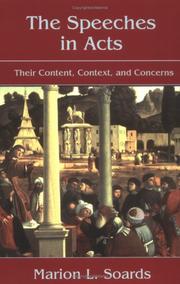
ISBN: 0664252214 9780664252212 Year: 1994 Publisher: Louisville Westminster/John Knox Press
Abstract | Keywords | Export | Availability | Bookmark
 Loading...
Loading...Choose an application
- Reference Manager
- EndNote
- RefWorks (Direct export to RefWorks)
Book
ISBN: 9789004359017 900435901X 9789004359024 9004359028 Year: 2017 Volume: 158 Publisher: Leiden ; Boston : Brill,
Abstract | Keywords | Export | Availability | Bookmark
 Loading...
Loading...Choose an application
- Reference Manager
- EndNote
- RefWorks (Direct export to RefWorks)
In The Function of the Speeches in the Acts of the Apostles , Janusz Kucicki offers a new approach to interpretation of speeches contained in the Acts of the Apostles. He separated all speeches from the narrative parts of Acts and analyze them independently. Without narrative contexts the speeches expose their interrelation that allow to categorize the speeches into two major groups. The first group named 'the topic speeches' contains the speeches, which create the topic group with common theme that is developed within the three speeches, where the first takes introductory character, the second takes the progressive character and the third takes the conclusive character. The second group of speeches named “the structural speeches” contains the speeches without developed theme.
Direct discourse in the Bible --- 226.6 --- 226.6 Actes des apotres --- 226.6 Handelingen der apostelen. Akten van de apostelen --- Actes des apotres --- Handelingen der apostelen. Akten van de apostelen --- Discourse, Direct, in the Bible --- Bible. --- Acts (Book of the New Testament) --- Acts of the Apostles --- Chongdo haengjŏn --- Sado haengjŏn --- Criticism, interpretation, etc. --- Direct discourse in the Bible.
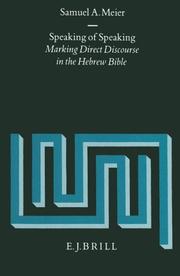
ISSN: 00835889 ISBN: 9004096027 9004275703 9789004096028 Year: 1992 Volume: v. 46 Publisher: Leiden Brill
Abstract | Keywords | Export | Availability | Bookmark
 Loading...
Loading...Choose an application
- Reference Manager
- EndNote
- RefWorks (Direct export to RefWorks)
Direct speech appears on nearly every page of the Hebrew Bible, and the large number of publications on direct discourse in the Bible highlights the importance of the subject for biblical studies. However, thus far only isolated aspects of the various problems that direct discourse presents have received attention. Studies of individual verbs introducing direct discourse, such as 'answer', 'speak', 'say', and others are necessarily atomistic, even though appropriate in their own right. Other markers of direct discourse, such as 'Thus said Yahweh', or 'oracle of Yahweh', tend to be treated as theological constructs isolated from the larger issues of direct discourse marking in general. Speaking of Speaking aims to enrich the reading of the biblical text by offering a coordinated analysis of all such markers, not only in order to consolidate a considerable body of work that is often overlooked by scholars, but also to move further toward a synthesis that can permit informed generalizations not possible at the present time. The comprehensive index facilitates the use of this book as a valuable reference tool. The exegetical, literary, and theological findings of this book will be of great significance for all levels of research in biblical studies.
Direct discourse in the Bible. --- Hebrew language --- Discourse analysis. --- 221.02*1 --- Direct discourse in the Bible --- -Jewish language --- Jews --- Semitic languages, Northwest --- Discourse, Direct, in the Bible --- Oud Testament: bijbelse filologie: hebreeuws --- Discourse analysis --- Languages --- -Oud Testament: bijbelse filologie: hebreeuws --- 221.02*1 Oud Testament: bijbelse filologie: hebreeuws --- -Discourse, Direct, in the Bible --- Jewish language --- Bible. --- Antico Testamento --- Hebrew Bible --- Hebrew Scriptures --- Kitve-ḳodesh --- Miḳra --- Old Testament --- Palaia Diathēkē --- Pentateuch, Prophets, and Hagiographa --- Sean-Tiomna --- Stary Testament --- Tanakh --- Tawrāt --- Torah, Neviʼim, Ketuvim --- Torah, Neviʼim u-Khetuvim --- Velho Testamento --- Language, style.
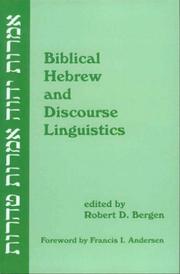
ISBN: 1556710070 9781556710070 Year: 1994 Publisher: Winona Lake Eisenbrauns
Abstract | Keywords | Export | Availability | Bookmark
 Loading...
Loading...Choose an application
- Reference Manager
- EndNote
- RefWorks (Direct export to RefWorks)
Hebrew language --- Direct discourse in the Bible --- Narration in the Bible --- Discourse analysis --- Congresses. --- Bible. --- Language, style --- 221.02*1 --- -Hebrew language --- -Narration in the Bible --- -Jewish language --- Jews --- Semitic languages, Northwest --- Discourse, Direct, in the Bible --- Oud Testament: bijbelse filologie: hebreeuws --- Congresses --- -Congresses --- Languages --- -Oud Testament: bijbelse filologie: hebreeuws --- 221.02*1 Oud Testament: bijbelse filologie: hebreeuws --- -221.02*1 Oud Testament: bijbelse filologie: hebreeuws --- Jewish language --- Discourse analysis&delete& --- Antico Testamento --- Hebrew Bible --- Hebrew Scriptures --- Kitve-ḳodesh --- Miḳra --- Old Testament --- Palaia Diathēkē --- Pentateuch, Prophets, and Hagiographa --- Sean-Tiomna --- Stary Testament --- Tanakh --- Tawrāt --- Torah, Neviʼim, Ketuvim --- Torah, Neviʼim u-Khetuvim --- Velho Testamento --- Hebrew language - Discourse analysis - Congresses. --- Direct discourse in the Bible - Congresses. --- Narration in the Bible - Congresses.
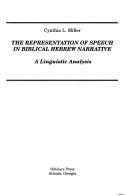
ISBN: 0788502484 9004387617 9780788502484 9789004387614 Year: 1996 Volume: 55 Publisher: Atlanta Scholars Press
Abstract | Keywords | Export | Availability | Bookmark
 Loading...
Loading...Choose an application
- Reference Manager
- EndNote
- RefWorks (Direct export to RefWorks)
Hebrew language --- Rhetoric in the Bible. --- Direct discourse in the Bible. --- Narration in the Bible. --- Discourse analysis. --- Bible. --- Language, style. --- 221.02*1 --- 221.015 --- Direct discourse in the Bible --- -Narration in the Bible --- Rhetoric in the Bible --- Jewish language --- Jews --- Semitic languages, Northwest --- Discourse, Direct, in the Bible --- Oud Testament: bijbelse filologie: hebreeuws --- Oud Testament: literaire kritiek; authenticiteit; bronnenstudie; Formgeschiche; Traditionsgeschichte; Redaktionsgeschichte --- Discourse analysis --- Languages --- 221.015 Oud Testament: literaire kritiek; authenticiteit; bronnenstudie; Formgeschiche; Traditionsgeschichte; Redaktionsgeschichte --- 221.02*1 Oud Testament: bijbelse filologie: hebreeuws --- Narration in the Bible --- Antico Testamento --- Hebrew Bible --- Hebrew Scriptures --- Kitve-ḳodesh --- Miḳra --- Old Testament --- Palaia Diathēkē --- Pentateuch, Prophets, and Hagiographa --- Sean-Tiomna --- Stary Testament --- Tanakh --- Tawrāt --- Torah, Neviʼim, Ketuvim --- Torah, Neviʼim u-Khetuvim --- Velho Testamento --- Hebrew language - Discourse analysis.
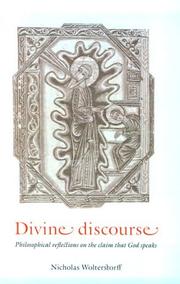
ISBN: 9780511598074 9780521475396 9780521475570 9781461949121 1461949122 0511598076 9781107387362 1107387361 0521475392 0521475570 1139882058 1107385059 1107390257 1107383811 1107398673 9781107398672 Year: 1995 Publisher: Cambridge Cambridge University press
Abstract | Keywords | Export | Availability | Bookmark
 Loading...
Loading...Choose an application
- Reference Manager
- EndNote
- RefWorks (Direct export to RefWorks)
Prominent in the canonical texts and traditions of Judaism, Christianity, and Islam is the claim that God speaks. Nicholas Wolterstorff argues that contemporary speech-action theory, when appropriately expanded, offers us a fascinating way of interpreting this claim and showing its intelligibility. He develops an innovative theory of double-hermeneutics - along the way opposing the current near-consensus led by Ricoeur and Derrida that there is something wrong-headed about interpreting a text to find out what its author said. Wolterstorff argues that at least some of us are entitled to believe that God has spoken. Philosophers have never before, in any sustained fashion, reflected on these matters, mainly because they have mistakenly treated speech as revelation.
Speech acts (Linguistics) --- Word of God (Christian theology) --- 21*015 --- 21*015 Theologie en taal --- Theologie en taal --- Illocutionary acts (Linguistics) --- Speech act theory (Linguistics) --- Speech events (Linguistics) --- Language and languages --- Linguistics --- Speech --- God's Word (Christian theology) --- Word of God (Theology) --- Word of the Lord (Christian theology) --- Theology, Doctrinal --- Word (Theology) --- Religious aspects&delete&&delete& --- Christianity --- Philosophy --- Religious aspects --- Christianity. --- Direct discourse in the Bible --- Parole de Dieu (Théologie) --- Discours direct dans la Bible --- Langage et langues --- Actes de parole --- Aspect religieux --- Christianisme --- Arts and Humanities --- Religion --- Speech acts (Linguistics) - Religious aspects - Christianity.
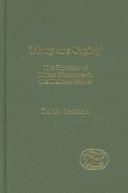
ISBN: 0567081931 9780567081933 Year: 2004 Volume: 397 Publisher: London Clark
Abstract | Keywords | Export | Availability | Bookmark
 Loading...
Loading...Choose an application
- Reference Manager
- EndNote
- RefWorks (Direct export to RefWorks)
In recent years, Old Testament scholars have come to see that the aesthetic and rhetorical richness of Hebrew poetry goes far beyond simple synonymous, antithetic, and synthetic parallelism. One aspect that has yet to receive sustained treatment is the poetic device known as direct discourse or quotation-the direct citation of a person's speech. Rolf A. Jacobson remedies this lack and makes a significant contribution to Old Testament studies by offering a sustained investigation into the function of direct discourse in the Hebrew Psalter. This leads to a greater understanding both of direct di
Direct discourse in the Bible. --- Hebrew language --- Discourse analysis. --- Bible. --- Criticism, interpretation, etc. --- Language, style. --- 223.3 --- Psalmen --- Quotation in the Bible. --- Rhetoric in the Bible. --- Direct discourse in the Bible --- Religion --- Philosophy & Religion --- Judaism --- Discourse analysis --- Discourse, Direct, in the Bible --- Biblos Psalmon (Book of the Old Testament) --- Buch der Preisungen (Book of the Old Testament) --- Liber Psalmorum (Book of the Old Testament) --- Mazāmīr (Book of the Old Testament) --- Preisungen (Book of the Old Testament) --- Psalmen (Book of the Old Testament) --- Psalmoi (Book of the Old Testament) --- Psalms (Book of the Old Testament) --- Psalms of David (Book of the Old Testament) --- Psaumes (Book of the Old Testament) --- Pseaumes de Dauid (Book of the Old Testament) --- Salmenes bok (Book of the Old Testament) --- Salmos (Book of the Old Testament) --- Shihen (Book of the Old Testament) --- Sifr al-Mazāmīr (Book of the Old Testament) --- Soltar (Book of the Old Testament) --- Tehilim (Book of the Old Testament) --- Tehillim (Book of the Old Testament) --- תהלים (Book of the Old Testament) --- Zsoltárkönyv (Book of the Old Testament) --- Hebrew language - Discourse analysis.
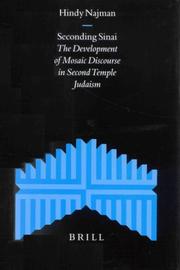
ISBN: 9004115420 9786610464142 1417597593 1280464143 9047400283 9781417597598 9789004115422 9789047400288 Year: 2003 Volume: 77 Publisher: Leiden Brill
Abstract | Keywords | Export | Availability | Bookmark
 Loading...
Loading...Choose an application
- Reference Manager
- EndNote
- RefWorks (Direct export to RefWorks)
This work criticizes the terms ""Pseudepigraphy"" and ""Rewritten Bible"", which presuppose conceptions of textual fidelity foreign to ancient Judaism. It develops the concept of a discourse whose creativity and authority depend on repeated returns to the exemplary figure of a founder.
Direct discourse in the Bible --- Directe rede in de bijbel --- Discours direct dans la bible --- 222.1 --- Jewish law --- -Judaism --- -Discourse, Direct, in the Bible --- Jews --- Religions --- Semites --- Biblical law --- Civil law (Jewish law) --- Halacha --- Halakha --- Halakhah --- Hebrew law --- Law, Hebrew --- Law, Jewish --- Law, Mosaic --- Law in the Bible --- Mosaic law --- Torah law --- Law, Semitic --- Commandments (Judaism) --- Octateuch. Heptateuch. Hexateuch. Pentateuch. Boeken van Mozes --- Interpretation and construction --- -History --- -Religion --- Religion --- Law --- Moses (Biblical leader) --- Judaism --- Discourse, Direct, in the Bible --- Hellenistic Judaism --- Judaism, Hellenistic --- History --- Moses --- Moïse --- Moiseĭ --- Moisés --- Mosè --- Mosheh --- Mosheh, --- Mosis --- Moyshe, --- Mózes --- Mūsá --- Nabī Mūsá --- משה --- משה, --- Bible. --- Chumash --- Five Books of Moses --- Ḥamishah ḥumshe Torah --- Ḥumash --- Kitāb-i Muqqadas --- Mose Ogyŏng (Book of the Old Testament) --- Pentateuch --- Pi︠a︡toknizhīe Moiseevo --- Sefer Ḥamishah ḥumshe Torah --- Tawrāh --- Torà (Pentateuch) --- Torah (Pentateuch) --- Tʻoris xutʻcigneuli --- Ureta --- תורה --- Haftarot --- Criticism, interpretation, etc., Jewish. --- Bible. O.T. Pentateuch --- Criticism, interpretation, etc. [Jewish ] --- To 1500 --- Post-exilic period, 586 B.C.-210 A.D. --- Direct discourse in the Bible.
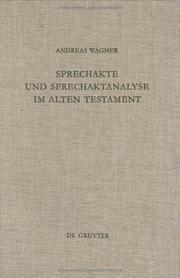
ISBN: 3110155494 Year: 1997 Volume: 253 Publisher: Berlin de Gruyter
Abstract | Keywords | Export | Availability | Bookmark
 Loading...
Loading...Choose an application
- Reference Manager
- EndNote
- RefWorks (Direct export to RefWorks)
Analyse du discours --- Discourse analysis --- Discourse grammar --- Tekstgrammatica --- Tekstlinguïstiek --- Text analysis --- Text grammar --- 221.02*1 --- Direct discourse in the Bible --- Hebrew language --- -Speech acts (Linguistics) --- Illocutionary acts (Linguistics) --- Speech act theory (Linguistics) --- Speech events (Linguistics) --- Language and languages --- Linguistics --- Semantics (Philosophy) --- Speech --- Jewish language --- Jews --- Semitic languages, Northwest --- Discourse, Direct, in the Bible --- Oud Testament: bijbelse filologie: hebreeuws --- Philosophy --- Languages --- 221.02*1 Oud Testament: bijbelse filologie: hebreeuws --- Speech acts (Linguistics) --- Bible. --- Antico Testamento --- Hebrew Bible --- Hebrew Scriptures --- Kitve-ḳodesh --- Miḳra --- Old Testament --- Palaia Diathēkē --- Pentateuch, Prophets, and Hagiographa --- Sean-Tiomna --- Stary Testament --- Tanakh --- Tawrāt --- Torah, Neviʼim, Ketuvim --- Torah, Neviʼim u-Khetuvim --- Velho Testamento --- Language, style. --- Bible. Old Testament --- Language, style
| Listing 1 - 10 of 10 |
Sort by
|

 Search
Search Feedback
Feedback About UniCat
About UniCat  Help
Help News
News